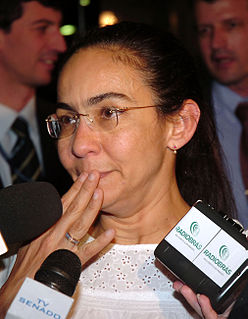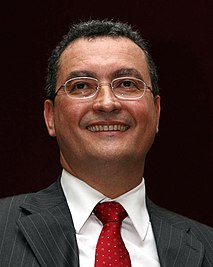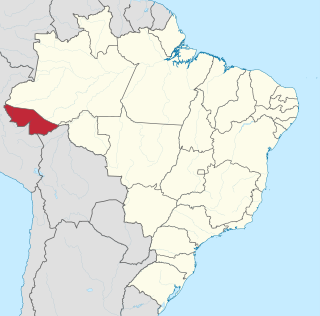The Socialism and Liberty Party is a Brazilian political party with 147,096 active members. PSOL is a left-wing to far-left party which is self-described as socialist and democratic.

Heloísa Helena Lima de Moraes Carvalho is a Brazilian nurse, schoolteacher, and politician, member of the political party Rede Sustentabilidade. She is the Brazilian woman to have received the third highest voting in a presidential race, ranking behind Marina Silva and Dilma Rousseff in 2010.

The Rio de Janeiro gubernatorial election was held on 5 October 2014 to elect the next Governor of the state of Rio de Janeiro. Since no candidate received more than 50% of the vote, a second-round runoff election was held on the 26th of October. Incumbent Governor Luiz Fernando Pezão, who was running for his first full term, was forced into the runoff against Marcelo Crivella but ultimately won.

The Acre gubernatorial election was held on October 3, 2010 to elect the next Governor of Acre. The PT's Tião Viana narrowly won the election and barely avoided a runoff.

The Bahia gubernatorial election was held on 5 October 2014 to elect the next Governor of the state of Bahia. If no candidate receives more than 50% of the vote, a second-round runoff election will be held on 26 October. Governor Jaques Wagner is ineligible to run due to term limits. In a stunning upset, the PT nominee Rui Costa won the election with 54.5% of valid votes against 37.3% of Paulo Souto in the first-round.

The Paraná gubernatorial election will be held on 5 October 2014 to elect the next Governor of the state of Paraná. If no candidate receives more than 50% of the vote, a second-round runoff election will be held on 26 October. Governor Beto Richa successfully ran for reelection, winning without the need for a runoff.

The Espírito Santo gubernatorial election was held on 5 October 2014 to elect the Governor of the state of Espírito Santo. Governor Renato Casagrande lost a bid for a second term to former Governor Paulo Hartung.

The Rondônia gubernatorial election will be held on 5 October 2014 to elect the next Governor of the state of Rondônia. If no candidate receives more than 50% of the vote, a second-round runoff election will be held on 26 October. Governor Confúcio Moura is running for a second term.

The Amapá gubernatorial election was held on 5 October 2014 to elect the next Governor of the state of Amapá. Since no candidate received more than 50% of the vote, a second-round runoff election was held on 26 October. Governor Camilo Capiberibe ran for a second term and was forced into a runoff with former Governor Waldez Góes.

The Mato Grosso gubernatorial election was held on 5 October 2014 to elect the next Governor of the state of Mato Grosso. If no candidate had received more than 50% of the vote, a second-round runoff election would have been held on 26 October. Governor Silval Barbosa did not run for a second term. Senator Pedro Taques of the PDT won election to the open seat in the first round.

Ronaldo Ramos Caiado is a Brazilian politician. An orthopedic physician trained at the School of Medicine and Surgery of Rio de Janeiro, he comes from a family landowners and politicians from Goiás. He is the grandson of Antonio Ramos Caiado. Caiado served as chairman of the União Democrática Ruralista in the late eighties (1986-1989), an organization that aims to defend the interests of landowners.

Álvaro Fernandes Dias is a Brazilian politician. He has represented Paraná in the Federal Senate since 1999. Previously, he was the governor of Paraná. He is a member of Podemos.

Sérgio Olímpio Gomes, best known as Major Olímpio, is a Brazilian police officer and politician, member of the Social Liberal Party (PSL). He was a state deputy for São Paulo, and leader of the Democratic Labor Party (PDT) during his term in the Legislative Assembly of São Paulo (ALESP). In the 2014 state election, he was elected federal deputy for São Paulo.

The 2018 São Paulo gubernatorial election occurred on 7 October 2018 and 28 October 2018, and elected the Governor and Vice Governor of São Paulo and 94 State Deputies.

The Rio de Janeiro gubernatorial election of October 2018 was for the election of the Governor and Vice Governor of Rio de Janeiro and 70 State Deputies. People also voted for 2 of 3 Senators of the state representation in the Federal legislative power, with 45 federal deputies representatives of the Rio de Janeiro State. A second round was held after no candidate managed to secure more than 50% of the Governor votes.

Patrus Ananias de Sousa is Brazilian lawyer and politician, member of the Workers' Party (PT). He was Minister of Agrarian Development during the second term of president Dilma Rousseff.

Márcio Luiz França Gomes is a Brazilian lawyer and politician, member of the Brazilian Socialist Party (PSB), former governor and vice governor of São Paulo, elected with Geraldo Alckmin in 2014. França assumed the office as governor in 6 April 2018 after Alckmin resigned to run for President of Brazil in the 2018 election. França was also a candidate for governor of São Paulo in 2018.

Benevenuto Daciolo Fonseca dos Santos, known as Cabo Daciolo, is a Brazilian military firefighter and politician affiliated to Patriota (PATRI). In 2014, he was elected federal deputy. He was expelled from the Socialism and Liberty Party in 2015 and later affiliated himself to the Labour Party of Brazil and then to Patriota.

The Acre gubernatorial election was held on 7 October 2018 to elect the next governor of the state, 8 federal deputies and two out of its three senators. Senator Gladson Cameli won 53% of the vote in the first round, making him the elected governor of Acre without the need of a runoff. Senator Sérgio Petecão was reelected with 30% of the vote and former congressman Márcio Bittar was elected with 23% of the vote, unseating Jorge Viana, on of the incumbent senators.
Carla Zambelli Salgado is a project manager and Brazilian political and political activist. Founder of the movement On the Streets, gained notoriety by the activism in favor of the impeachment of the ex-president Dilma Rousseff. In the elections of 2018, she was elected federal deputy by São Paulo, by the Social Liberal Party (PSL).
























